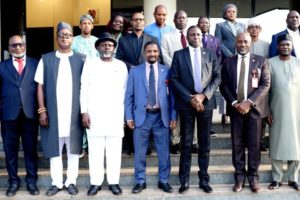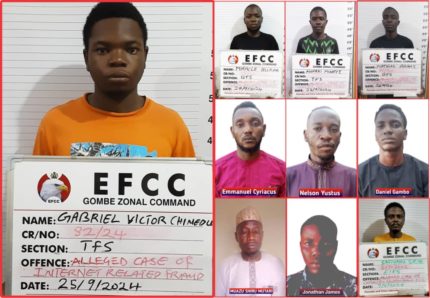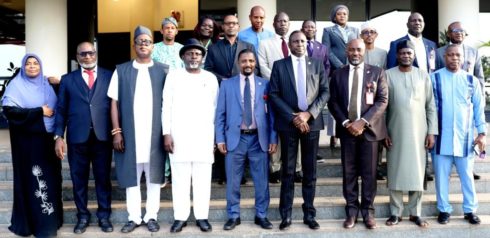The Economic and Financial Crimes Commission (EFCC) has once again demonstrated its commitment to tackling financial crimes by securing the conviction of ten fraudsters in various courts across Nigeria. The convicts, who were sentenced to different jail terms, faced charges related to internet fraud, impersonation, and employment fraud. The Gombe Zonal Directorate of the EFCC led the legal proceedings in the cases, which involved multiple defendants.
The convicts, identified as Emmanuel Cyriacus, Nelson Yustus, Gabriel Victor Shindu, Daniel Gambo, Miracle Bukar, Mighty Awarri, Jonathan James, Mathias Adams, Sani Safiyanu, and Muazu Shira Mutari, were prosecuted separately in courts across Gombe, Adamawa, Taraba, and Bauchi States. Their crimes spanned various fraudulent activities, including impersonating foreign nationals and creating false employment documents.
Details of the Charges and Convictions
Each of the ten fraudsters faced serious charges related to financial misconduct and deception. For instance, Nelson Yustus was accused of impersonating an American named Jake on the Zangi private messenger application, through which he defrauded individuals of $150. Similarly, Sani Safiyanu was charged with possession of fraudulent documents, claiming he could secure employment for individuals through fake congratulatory messages from government agencies like the Independent National Electoral Commission (INEC) and the Nigeria Police Force.
The charges against these individuals were clear and specific. In Safiyanu’s case, he was found in possession of several email accounts used to perpetrate employment fraud. Meanwhile, Yustus’s case involved using social media platforms like Signal to impersonate a white woman from the USA to deceive foreign nationals. Upon arraignment, most of the defendants pleaded guilty to their charges, while others opted to defend their actions in court.
Court Sentences and Fines
Following their convictions, the fraudsters were sentenced by various judges, with penalties ranging from fines to prison sentences. Justices Hammed Isha and Benjamin M. Lawal of the Gombe State High Court presided over the cases of Shindu, Awari, Bukar, Gambo, Yustus, James, and Cyriacus. They were each sentenced to 10 years in prison or given the option of paying fines ranging from N200,000 to N300,000. Mathias Adams, however, received a slightly lesser sentence of five years or a fine of N200,000.
In other cases, Justice Mushkur Salisu of the Federal High Court in Jalingo, Taraba State, sentenced Safiyanu to five years imprisonment on one count and one year on another, with the sentences to run concurrently. He was also given the option of paying fines amounting to N250,000. Similarly, Justice Muazu Abubakar of Bauchi State High Court sentenced Muazu Shira Mutari to two years imprisonment with a fine of N200,000 for intent to defraud.
These judgments reflect the EFCC’s ongoing commitment to prosecuting cybercrime offenders and ensuring justice is served, sending a strong message to potential fraudsters across the country.
EFCC’s Efforts in Tackling Fraud Beyond the Internet
Beyond internet fraud, the EFCC continues its fight against other forms of financial misconduct. In another case, the Gombe Zonal Directorate arraigned four individuals, Solomon Yohanna, Shedrach Naphtali, Hassan Mohammed, and Abdullahi Abubakar, for impersonating EFCC officials to defraud unsuspecting citizens. They were charged with forging EFCC documents, including letters of authority and investigation approval documents, which they used to claim they were tasked with auditing and supervising projects in Guyuk Local Government.
One of the defendants, Solomon Yohanna, pleaded guilty to the charges, while the other defendants denied the allegations. Upon the guilty plea, the prosecution sought to present witnesses to further substantiate the claims. However, the defense argued that they were not ready to present any witnesses. Justice Hammed Isha granted bail to the second, third, and fourth defendants, each set at N5,000,000, while remanding Yohanna at Yola Correctional Centre until the trial resumes in November 2024.
This case highlights the EFCC’s broader mandate in combating not only cybercrime but also various forms of fraud and financial misconduct, ensuring the credibility of public institutions and safeguarding the public from fraudulent schemes.
Implications for Future Fraud Prevention
The convictions of the ten fraudsters and the ongoing prosecution of the four accused of impersonating EFCC officials underline the effectiveness of the EFCC’s operations in Nigeria. As financial fraud evolves, with perpetrators finding new ways to deceive victims, the EFCC continues to adapt and respond with legal actions that ensure such individuals face the full extent of the law.
The success of these prosecutions will likely deter future fraudsters, especially in cases of cybercrime and impersonation. By leveraging legal frameworks such as the Advance Fee Fraud Act and the Penal Code, the EFCC is steadily reinforcing its stance against financial crime, safeguarding both local and international victims from scams. As more cases are prosecuted, the message is clear: financial crimes will not go unpunished in Nigeria, and the EFCC remains at the forefront of the fight against fraud.
Table of Contents
Discover more from OGM News NG
Subscribe to get the latest posts sent to your email.














